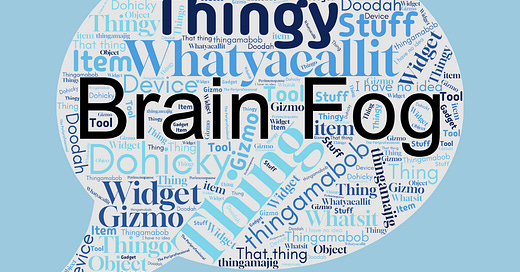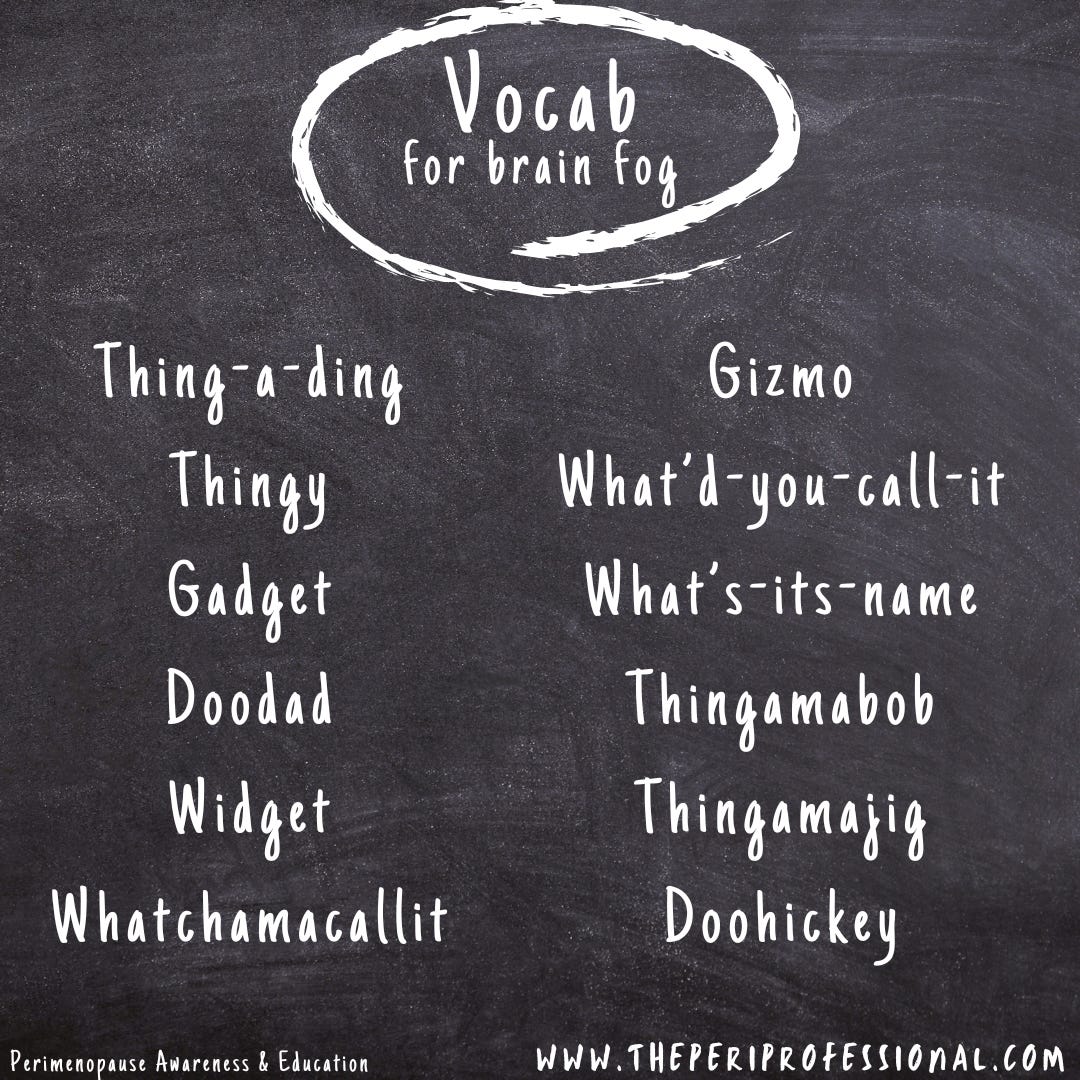The Periprofessional is a weekly email newsletter and website that aims to make learning about the biology of perimenopause both fun and engaging. Let’s explore this important stage of life together! All articles are written by a certified perimenopause educator - me! Sign up here:
Want to share your brain fog story? Scroll to the comments section.
More Than Words
As a person who reads a lot, wait…, what’s that called again? Oh, right, an avid reader. As an avid reader, I had an impressive vocabulary until I reached perimenopause. Now, I’m reduced to the most basic words and thoughts.
My enthusiasm for forcing leading my family to independent bookstores during our travels is well-known. At a cute bookstore during a recent trip, I picked up a weighty 721-page book1 where it became shockingly clear to me just how far my ability to communicate words has fallen.
As I stood leaning against the shelf and reading the first few pages, the words leaped out at me. This sparked a sense of pure joy as I admired the elegance of the author’s word choice. Yet, at the same time, I was filled with sheer terror that I’d never be able to communicate using complex words again.
I know I’m not alone. Many women complain of losing the ability to recall words and losing their concentration during perimenopause. In fact, according to University of Illinois Chicago Professor Pauline Maki, a researcher of menopause and cognition, “Brain efficiency measured by differences in global brain networks is lower in the perimenopause group compared to the pre-menopause group.”
What this means for us: A perimenopause brain is less efficient. Dr. Lisa Mosconi, a brain neuroscientist who is a leading researcher studying brains during perimenopause and menopause, says “there is a 30% reduction in brain energy during perimenopause.”2
We think and process information more slowly.
I actually bore myself using the same words over and over. I’ve become a dullard (oh, good one, Shelby!). President Obama said he was glad to be leaving office, so he didn’t have to listen to himself talk as much. I feel the same way about my slow brain. I don’t want to listen to myself think at this pace.
I know you may be thinking I’m nuts for complaining. I’m able to successfully write knowledgeable articles week after week (mostly from information in my brain unless I have to source something), so what’s the problem? These articles take a lot of brain power and work to write. It takes me days. If I had the brain functions of my pre-perimenopause years, I could use better words like meridian, impediment, hindrances, and vigor. I could write articles much quicker. I could stay focused better while writing said articles. It would be easier for me all around.
Although I know I’m doing well overall now, it wasn’t always like this. My brain was hit hard when I started perimenopause. I’ve described my experiences in prior articles and what I did to overcome this to improve my brain’s energy (Read: That Thing on The Thing). But I’m still going through my “construction project,” as Dr. Mosconi calls it, and I feel its effects.
The Definition of Perimenopause Brain Fog
One thing that I struggle with is coming up with specific words. I can describe something but often forget the one word that could replace the entire description. For example, I’ll say “a person who can’t make a decision” instead of “indecisive.” This makes sense once you look at the definition of brain fog in midlife.
The definition of perimenopause/menopause brain fog is “the constellation of cognitive symptoms experienced by women around menopause, which most frequently manifest in memory and attention difficulties and involves symptoms as difficulty encoding and recalling words, names, stories or numbers, difficulty maintaining a train of thought, distractibility, forgetting intentions (reason for coming into a specific room), and difficulty switching between tasks.”
Here is the same information in another way:
The definition of perimenopause/menopause brain fog is “the constellation of cognitive symptoms experienced by women around menopause, which:
most frequently manifest in memory and attention difficulties
involves symptoms such as difficulty encoding and recalling words, names, stories, or numbers
difficulty maintaining a train of thought
distractibility
forgetting intentions (reason for coming into a specific room)
difficulty switching between tasks.”3
Cognitive difficulties at midlife are linked to changes in estradiol estrogen, hot flashes, sleep issues, and changes in mood.4 I’ll add another one to the list: a hyperaroused nervous system due to fluctuating hormones.
Across 6 different cognition and menopause studies, the most common theme was issues with verbal learning and verbal memory, with processing speed coming in at second place. This makes sense based on what I’m experiencing. Basically, we have trouble with …. words.
I can share two funny stories to highlight this:
I was trying to tell my husband that our daughter was using the electric candle as a nightlight when he asked where it went. What he heard me say was, "She was using it as a ...ah … ah…. ah….. um... umbrella."
Yesterday, I asked my husband, “What’s the opposite of a paperback book?” I couldn’t remember the name hardcover – all I could come up with was “hardcopy.”
There are certain times of the day when my brain works better than others. Early morning and later in the evening, I feel much less foggy. My best ideas pop up during these times. Coincidentally, these times are the lowest for circulating cortisol on a natural cycle.
Word Up
According to Dr. Mosconi, the effects felt during our perimenopause reconstruction project are mostly temporary as our brains adapt to the new normal of having less circulating hormones.5
So until my brain gets back up to speed, which I’ve been promised it mostly will, I need to get creative. I’m tired of using thing, stuff, and crap all of the time, so I put together a list of alternatives to give myself some variety:
Feel free to use them too! Make it fun, and pretend you’re from the 1900s.
“What was I saying?” is commonly said by my friends who lose their train of thought while talking. I can sometimes help them remember. Whatever it was, it was very interesting. I often say, “What’s that called?” as I smack the back of my hand across my husband’s chest as we sit next to each other on the couch (I do a lot of my best thinking while we watch TV, apparently). And the one I seem to be saying the most lately is, “What was I doing?”
The Periprofessional’s Vagtionary™6 of Cool Peri-Related Words
The book I bought at the bookstore that day reminded me how much I love words. I hope I can inspire you, too. Here are some cool words for hot days that I find funny and can be applied to perimenopause.
Shenanigans (silly behavior)
These hormonal shenanigans are making me feel sick to my stomach.
Befuddle (confuse)
Doctor, I’m just as befuddled as you are by these symptoms.
High jinks (pranks)
These periods of perimenopausal high jinks are the bane of my existence.
Smack dab (precise)
This pimple is smack dab in the middle of my chin.
Teeny weeny, itty bitty, teeny tiny, itsy bitsy (very small)7
It was just a teeny weeny, itty bitty, teeny tiny, itsy bitsy moment where I felt like myself.
Ginormous (very large)
That was a ginormous amount of blood that just came out of me.
Malarkey (nonsense)
It’s a bunch of marlarky that I have to go through perimenopause.
Sizzling (hot)
These hot flashes are making me sizzling hot.
Discombobulated (a mess)
I feel like my head isn’t on straight, and I feel so discombobulated.
Disgruntled (dissatisfied)
I don’t know what gruntled is, but I know I’m disgruntled.
Icky (yucky)
This horrible taste in my mouth is icky.
Help!
This article isn’t about tips (you can find them in That Thing on The Thing), but quickly, here are things to consider:
Exercise your brain, do challenging things like trying to remember the 6-digit numeric code texted to you as you log in to websites.
Be smoke-free
Stay connected with people
Movement (150 mins of moderate-intensity aerobic physical activity is the guideline)
Maintain a healthy BMI
Lean into it – laugh when something happens; share stories with your friends as stress is only going to make it worse
Thanks to the inspiration of the book I purchased, I’m on a mission to relearn the vocabulary I’ve lost and reacquaint myself with big words and thoughts. I’ve got to get this brain back online because this stuff is driving me crazy.
If you enjoyed this article, please post a comment below or leave a heart. It takes two seconds. I’d greatly appreciate it.
I’m honored to be a small part of your perimenopause journey!
Be well, stay cool…
Disclaimer, Content Use Policy, Privacy Policy
Fayne by Ann-Marie MacDonald at the Bookmark bookstore in Halifax, Nova Scotia, Canada
Mosconi, PhD, Lisa. The Menopause Brain. Penguin Random House. 2024
Maki, P. M., and N. G. Jaff. “Brain Fog in Menopause: A Health-Care Professional’s Guide for Decision-Making and Counseling on Cognition.” Climacteric, vol. 25, no. 6, 30 Sept. 2022, pp. 1–9, https://doi.org/10.1080/13697137.2022.2122792.
Maki, P. M., and N. G. Jaff. “Brain Fog in Menopause: A Health-Care Professional’s Guide for Decision-Making and Counseling on Cognition.” Climacteric, vol. 25, no. 6, 30 Sept. 2022, pp. 1–9, https://doi.org/10.1080/13697137.2022.2122792.
Mosconi, PhD, Lisa. The Menopause Brain. Penguin Random House. 2024
Let’s take the “dic” out of dictionary. For more fun words, visit the Vagtionary™
Giving credit to comedian Brian Regan for coming up with this one.










How about when my husband or kid is in the kitchen and is asking for directions to where something is?
"It's behind that door above your brain holder to the opposite of your left by that blue ceramic container for coffee."
"You mean in the cabinet above my head on the right next to the blue coffee mug?"
Or when needing to give instructions on how to do something in the kitchen?
"Get the bowl, no the large one, put the temperature in the baking box to 350..."
Gets up. "Oh nevermind, I'll just do it."
"What did I do mom? Why are you frustrated with me?"
"Its not you, it's me."
My brain parts no work good.
Loved reading this article; it makes me feel not so alone with my brain that frequently feels like cotton candy instead of a functioning organ. How many times do the words disappear somewhere between my brain and my tongue? And does anyone else have problems spelling? For example, my fingers type "femail" instead of "female" these days. Ugh. Thank goodness for spellcheck.